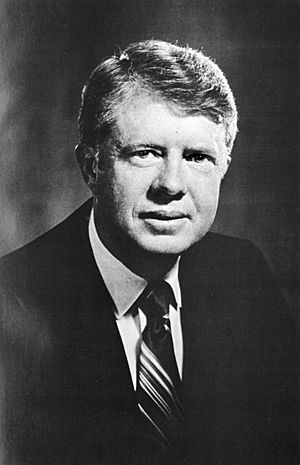Jimmy Carter facts for kids
Quick facts for kids
Jimmy Carter
|
|
|---|---|
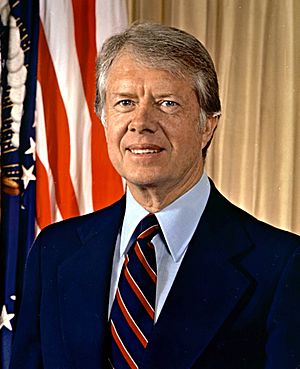
Official portrait, 1978
|
|
| 39th President of the United States | |
| In office January 20, 1977 – January 20, 1981 |
|
| Vice President | Walter Mondale |
| Preceded by | Gerald Ford |
| Succeeded by | Ronald Reagan |
| 76th Governor of Georgia | |
| In office January 12, 1971 – January 14, 1975 |
|
| Lieutenant | Lester Maddox |
| Preceded by | Lester Maddox |
| Succeeded by | George Busbee |
| Member of the Georgia State Senate from the 14th district |
|
| In office January 14, 1963 – January 9, 1967 |
|
| Preceded by | Constituency established |
| Succeeded by | Hugh Carter |
| Personal details | |
| Born |
James Earl Carter Jr.
October 1, 1924 Plains, Georgia, U.S. |
| Died | December 29, 2024 (aged 100) Plains, Georgia, U.S. |
| Political party | Democratic |
| Spouse | |
| Children | 4, including Jack and Amy |
| Parents | |
| Relatives | Carter family |
| Education | United States Naval Academy (BS) |
| Civilian awards | Full list |
| Signature |  |
| Military service | |
| Branch/service | United States Navy |
| Years of service |
|
| Rank | Lieutenant |
| Battles/wars | World War II |
| Military awards | |
James Earl Carter Jr. (born October 1, 1924 – died December 29, 2024) was an American politician and humanitarian. He served as the 39th president of the United States from 1977 to 1981.
While historians have different opinions on his time as president, his work after leaving office has been highly praised. He even won a Nobel Peace Prize in 2002 for his efforts. His post-presidency was the longest in U.S. history.
Contents
- Early Life and Education
- Naval Career and Service
- Starting a Peanut Farm
- Early Political Career in Georgia
- Becoming President of the United States
- Life After the Presidency
- Personal Life and Family
- Death and Legacy
- Interesting Facts About Jimmy Carter
- Jimmy Carter's Famous Quotes
- Timeline of Jimmy Carter's Life
- Images for kids
- See also
Early Life and Education
Jimmy Carter was born on October 1, 1924, in Plains, Georgia. He was the oldest son of Bessie Lillian and James Earl Carter Sr.. His family moved several times when he was a baby.
He went to Plains High School from 1937 to 1941. During this time, he joined the Future Farmers of America. This helped him develop a lifelong love for woodworking.
After high school, Carter attended Georgia Southwestern College. He then went on to graduate from the United States Naval Academy in 1946. He earned a Bachelor of Science degree there.
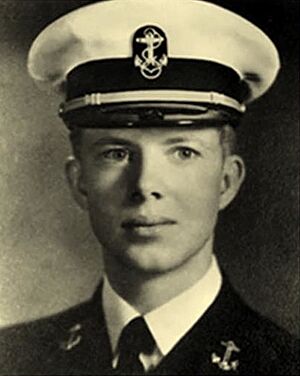
After graduating from the Naval Academy, Jimmy Carter joined the U.S. Navy. He became an officer who worked on nuclear submarines. Even though he didn't fight in a war, his time in the Navy taught him a lot about duty and discipline.
In 1952, there was an accident at a nuclear reactor in Canada. Radioactive water flooded the building. Carter was sent there to help lead a U.S. team. They worked with Canadian teams to safely shut down the damaged reactor. This experience helped shape his views on nuclear energy.
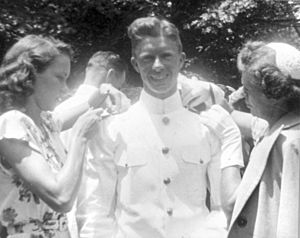
Carter served in the U.S. Navy for seven years. In 1953, his father passed away. Carter decided to leave the Navy to go back home to Plains and take over the family's peanut farm.
Starting a Peanut Farm
Becoming an agri-businessman was not easy for Carter. He was determined to make the family's peanut farm grow. His first year was tough because a drought ruined the harvest.
To keep the farm going, Carter had to borrow money from banks. He also took classes and studied farming. His wife, Rosalynn, learned how to manage the business's finances. Even though they barely made money at first, the Carters worked hard. They grew their business and became very successful.
Early Political Career in Georgia
Jimmy Carter's political journey began in the Georgia State Senate. He served there from 1963 to 1967. After that, he became the Governor of Georgia, serving from 1971 to 1975.
As governor, he focused on important issues. He worked to make the state's education system better. He also aimed to protect Georgia's natural environment.
Carter also made civil rights a high priority. He hired more Black state employees. He also placed portraits of important Black Georgians in the capitol building. These included Martin Luther King Jr., Lucy Craft Laney, and Henry McNeal Turner.
Becoming President of the United States

Before becoming president, Carter was not widely known outside of Georgia. He was considered a dark-horse candidate. However, he won the Democratic nomination for president.
In the 1976 election, he narrowly beat the sitting Republican president, Gerald Ford. Carter became the 39th president of the United States.
Key Actions as President
Carter became president on January 20, 1977. Early in his term, he pardoned all Vietnam War draft evaders. He also created a national energy policy. This policy focused on saving energy, controlling prices, and developing new technologies.
Some of his major achievements include:
- The Camp David Accords: A peace agreement between Egypt and Israel.
- The Panama Canal Treaties: Agreements that gave Panama control of the Panama Canal.
- Establishing the U.S. Department of Energy and the Department of Education.
Challenges During His Presidency
The end of Carter's presidency faced several challenges:
- The 1979 energy crisis: A time when gas prices went very high.
- The Three Mile Island accident: A serious nuclear power plant accident.
- The Iran hostage crisis: American diplomats were held hostage in Iran for over a year.
- The Soviet invasion of Afghanistan: This led Carter to take strong actions against the Soviet Union. He ended cooperation, stopped grain sales, and led a boycott of the 1980 Summer Olympics in Moscow.
Carter lost the 1980 presidential election to Ronald Reagan.
Life After the Presidency
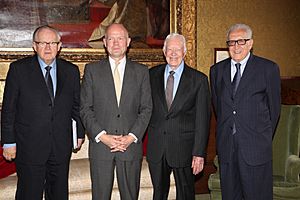
After leaving the White House in 1981, Jimmy Carter started the Carter Center. This organization works to promote human rights and resolve conflicts around the world. His work with the Carter Center earned him the Nobel Peace Prize in 2002.
He traveled widely to help with peace talks and monitor elections. He also worked to get rid of infectious diseases. Carter was also a key supporter of Habitat for Humanity, a group that builds homes for people in need. He wrote many books, including his political memories and poetry.
Personal Life and Family
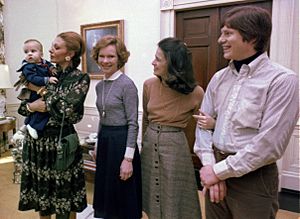
Jimmy Carter married Rosalynn Smith in 1946. They had three sons and one daughter. They were married for over 75 years, becoming the longest-wed presidential couple in U.S. history.
Carter enjoyed many hobbies, such as painting, fly fishing, woodworking, cycling, tennis, and skiing. He also loved poetry.
Death and Legacy
Jimmy Carter entered hospice care several months before his 99th birthday. He often said he never expected to live so long. He believed a good marriage was a big reason for his long life.
Carter passed away at his home in Plains, Georgia, on December 29, 2024, at the age of 100.
Even though his presidency faced challenges, his work for peace and human rights after leaving office made him one of the most respected former presidents. In 2024, the White House honored his naval service and peace efforts with an official Christmas ornament. This was special because he was still alive when it was unveiled.
Interesting Facts About Jimmy Carter
- Jimmy Carter was the only U.S. president who was a licensed nuclear engineer.
- He was the longest-lived U.S. president. He was also the only one to reach 100 years of age.
- Carter was a talented painter. He painted hundreds of pictures, often showing scenes from his life.
- He and his wife Rosalynn were married for over 75 years. This shows their strong and lasting love.
- He was known for teaching Sunday school. He continued this tradition even after he left the White House.
Jimmy Carter's Famous Quotes
- "To be true to ourselves, we must be true to others."
- "Wherever life takes us, there are always moments of wonder."
- "We have to inspire our children and grandchildren to take on challenges and risks that at first may seem to be overwhelming, or even impossible. They need to understand that the only failure is not trying."
- "America did not invent human rights. In a very real sense… human rights invented America."
- "You only have to have two loves in your life: for God, and for the person in front of you at any particular time."
- "Earlier in my life, I thought the things that mattered were the things that you could see, like your car, your house, your wealth, your property, your office. But as I’ve grown older I’ve become convinced that the things that matter most are the things that you can’t see—the love you share with others, your inner purpose, your comfort with who you are."
- "We must adjust to changing times and still hold to unchanging principles."
- "We are of course a nation of differences. Those differences don't make us weak. They're the source of our strength."
Timeline of Jimmy Carter's Life
- 1924: Born in Plains, Georgia.
- 1946: Graduated from the U.S. Naval Academy.
- 1953: Left the Navy and returned to Plains to run the family farm.
- 1963-1967: Served in the Georgia State Senate.
- 1971-1975: Served as Governor of Georgia.
- 1976: Elected President of the United States.
- 1977-1981: Served as President of the United States.
- 1982: Established The Carter Center.
- 2002: Awarded the Nobel Peace Prize for his work promoting peace and human rights.
- 2024: Died in Plains, Georgia, on December 29, 2024, at the age of 100.
Images for kids
-
The Carter family store, part of Carter's Boyhood Farm, in Plains, Georgia
-
Newly elected governor of Arkansas and future president Bill Clinton meets with President Carter in 1978
-
Carter signing the Airline Deregulation Act, 1978
-
Carter standing alongside Israeli Prime Minister Menachem Begin, during his 1979 visit
-
First Lady Rosalynn Carter, Tanzanian leader Julius Nyerere, and Carter, 1977
-
Deng Xiaoping with President Carter
-
Carter with King Hussein of Jordan and Shah of Iran in 1977
-
Carter and Leonid Brezhnev signing the SALT II treaty at the Hofburg Palace in Vienna, June 18, 1979
-
Carter, Israeli Prime Minister Menachem Begin and Zbigniew Brzezinski in September 1978
-
The state funeral of George H. W. Bush in December 2018. Carter and his wife Rosalynn can be seen on the far right of the photograph.
-
Carter in Plains, Georgia, 2008
See also
 In Spanish: Jimmy Carter para niños
In Spanish: Jimmy Carter para niños
 | Dorothy Vaughan |
 | Charles Henry Turner |
 | Hildrus Poindexter |
 | Henry Cecil McBay |


